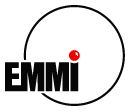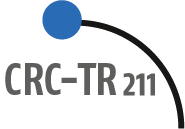Organizers: Jens Braun, Michael Buballa, Stefan Flörchinger, Jan M. Pawlowski, Dirk H. Rischke, Bernd-Jochen Schaefer, Lorenz von Smekal
E-mail: funscs@theorie.ikp.physik.tu-darmstadt.de
poster
Topics Covered
- Phases of strongly correlated systems
- Dynamics of strongly correlated systems
- Bound states and resonances in strongly correlated systems
Speakers and participants
Scientific case
The phases and dynamics of strongly correlated systems pose some of the most interesting and demanding questions to date. Strong correlations occur in a large variety of systems ranging from ultracold atoms in the vicinity of the unitary limit, nuclei and dense nuclear matter as present in the interior of neutron stars, to the quark-gluon plasma, that had existed in the early Universe and is created in heavy-ion collisions in the laboratory at RHIC and LHC. Many of these strongly correlated systems will be probed by future experiments at the FAIR facility, and all of these systems are at the heart of the EMMI research program.
Progress in answering these interesting questions can only be made with fully non-perturbative approaches such as Functional Methods. These comprise Renormalization Group (RG) approaches such as the Functional RG and the Similarity RG, Dyson-Schwinger and Bethe-Salpeter equations, nPI approaches, and various combinations thereof.
Despite vast differences in scales, temperatures, and densities the aforementioned strongly correlated systems have many common features. For instance, the expansion of ultracold gases close to the unitary limit shows a collective behaviour similar to that of the quark-gluon plasma created in heavy-ion collisions. These similarities have triggered three very successful EMMI workshops ('Quark-Gluon Plasma meets Cold Atoms - Episode I - III') in the past, co-organized by parts of the present organizing committee.
Since the last edition of this workshop series in 2012 there has been tremendous progress in the theoretical understanding of correlated systems in and out of equilibrium. This progress was also achieved because of major methodological advances in Functional Methods. The time is therefore ripe for reviewing progress in this field in the concise format of a one-week workshop, bringing together a few selected world experts as well as young researchers.
In contrast to the previous abovementioned workshop series, the focus of the current workshop is shifted from experiment and few-body systems towards theory and methodological developments. As explained in the next paragraph, this workshop should be seen as the first part and theoretical preparation for a fourth installment of the 'Quark-Gluon Plasma meets Cold Atoms' workshop. Moreover, because of similar developments in the physics of strongly correlated QCD, and statistical and condensed-matter systems, both in and out of equilibrium, we expect a fruitful exchange of ideas from experts in that area. This is reflected in our choice of key speakers.
Naturally, the close interplay between theory and experiment in this fascinating area also calls for a joint theory-experiment workshop in the tradition of the 'Quark-Gluon Plasma meets Cold Atoms - Episode I - III') mentioned above. We envisage such a workshop on the basis of the present theory workshop 'Functional Methods in Strongly Correlated Systems' which should therefore be seen as the first part and a theoretical preparation for a fourth installment of the 'Quark-Gluon Plasma meets Cold Atoms' workshop in the near future.
Organizational information
The workshop takes place at the Darmstädter Haus, which we have reserved from Sunday, March 31, late afternoon
until Sunday, April 7 in the morning.
Current weather conditions can be viewed at the webcam of Hotel Birkenhöhe.
Program
General structure:- Sunday, March 31: arrival and reception
- Monday, April 1 - Friday April 5: invited talks and selected contributions
- Saturday, April 6: informal discussions and excursions in small groups
- Sunday, April 7: latest departure
Timetable
Registration
If you want to participate, please register here ( deadline: February 28, 2019 ).
We charge a workshop fee of 50 €.Please note that the number of participants is limited to 50. Therefore a registration does not guarantee the participation. At the beginning of March we will contact you by e-mail and let you know whether or not you will be accepted as a participant.


